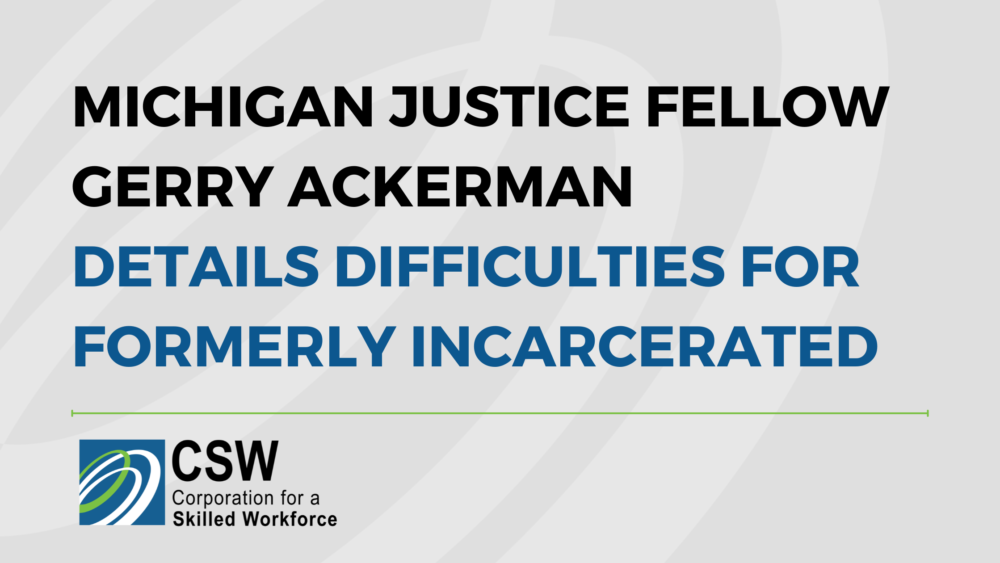[vc_custom_heading text=”Author” font_container=”tag:h2|text_align:left|color:%23000000″ google_fonts=”font_family:Montserrat%3Aregular%2C700|font_style:700%20bold%20regular%3A700%3Anormal”]
There is nothing more important to a prisoner than the knowledge that one day he or she will be returned to the world. We are constantly praying and hoping that nothing will go wrong that will prevent or delay our eventual freedom, even though most of us will never be truly free ever again. Verifying that all boxes required by the parole board have been completed. All programs fulfilled? Check. Rule violations avoided? Check. Consistent institutional employment maintained? Check. Once those are confirmed it’s time to begin planning for the moment I walk out the door back into the world. How will I survive in a world that I have been absent from for twenty years? Will I make it?
The most amazing transition I ever made was from a prison cell to the Michigan Justice Fund. For most of the time that I was incarcerated, it was obvious that almost no one cared what I had to say. Of course, there were those people employed in agencies with hearts the size of watermelons trying to make so many things work. But as it was difficult for me to make things happen inside prison walls, they had obstacles and barriers keeping them from achieving their goals. It seemed their biggest issue was the enormous number of prisoners needing support. There are far more prisoners that need help than most agencies have the capacity to handle, not to mention the rules and regulations from the Michigan Department of Corrections that can make communication with the outside world difficult.
My experience has shown me a more complete picture of the prison system and its effects on human beings. Going to prison in and of itself is traumatic, not accounting for the possible trauma inflicted during the prison sentence. Everyone’s experience is different, but nearly always traumatic. Most people couldn’t imagine spending one day in jail, let alone years. Prison strips people of their value and worth by reducing you to a number. A life spent behind barbed wire and bars is a constant reminder that you are no longer free. It’s like living in a zoo.
Many of the people that are there to protect you and ensure that you receive the services entitled to you are plainly indifferent to your needs. Prison is a hurry-up and wait experience, where getting the things you need can take months, sometimes years. I think of this as “administrative trauma.” Then there’s the trauma experienced in day-to-day life in prison.
During my stay in prison, I witnessed men being stabbed brutally by other prisoners. Men were beaten by other prisoners. This violence can be perpetrated for reasons ranging from merely bumping into the wrong person to being labeled a rat, or because you are a member of a different group. Your own safety is constantly top of mind. The violence in prison is sometimes encouraged and condoned by the corrections officers that are there to keep you safe. Reporting abuse is generally minimized by the administration. Squabbles between prisoners are sometimes noted as just fights rather than the assault that they really were. This is because you can’t tell on anyone, or next time you may not survive the attack.
At the worst end of the violence spectrum is rape. Rape by its very name should bring chills to anyone. Rape in prison is not always a sexual attack but rather another way of degrading another prisoner and diminishing their value as a human. Reporting rape can have the same consequence as reporting another assault. Too many times the victim is labeled a willing participant and then there is no consequence for the attacker. Many don’t even report the rape in an attempt to avoid the shame that will be bestowed upon them when it is made public. Of course, it doesn’t really matter because once the rape has taken place, others will find out because in prison information is power. It is very difficult to recover from, or even just to forget, the trauma you experience in prison.
Health care is for the most part non-existent. If you are ill and seek medical care it could take days before they examine you only to do nothing and charge you five dollars. While the five dollars doesn’t seem like much, some prisoners only earn $11.00 a month if they are indigent. The State loans them $11.00 a month which they must pay back. That means a medical visit is almost 50% of the standard monthly income. Can you imagine spending half of your monthly income to have a nurse tell you to go back to your cell and order some aspirin from the store? I’ve witnessed corrections officers refuse to take someone to health care after complaining of chest pains, only for the prisoner to die by the time they are seen by any health care personnel. I know a number of men that have died in prison, and I’m not sure the family ever finds out what truly happened to their loved ones.
You can imagine how urgently people try to get out of prison. For many of us, every day was spent planning and strategizing what we would do when and if we received a parole. You try to get involved in all possible positive activities so the Parole Board will see how hard you’ve tried to rehabilitate yourself. It is written in policy that rehabilitation is the prisoner’s responsibility. As you get ready to see the Board your counselor reviews your file with you to see if you’ve completed all the required programming. They will check if you attempted to enroll in the positive programs at the last minute. Many prisoners would like to have some training so that they can move on with their lives when they get out in hopes of never coming back. But while there are training programs available, there are too few programs, and too few prisoners are allowed to participate in them. For example, one facility offered a CDL (Commercial driver’s License), but it was only a textbook course with no hands-on driving. Participation in this, and other training programs frequently requires years of persistence. Sex offenders are precluded from taking part in this and other training due to Michigan Department of Corrections policies, further complicating things for a group that overwhelmingly struggles to secure stable housing upon release.
The other important thing we prisoners do is come up with a parole plan. We try to organize our lives for success when we get out. We are most concerned with where we’ll live and where we’ll work. Finding accurate resources can be difficult as many of the lists you are provided are outdated. In my case, I felt it necessary to do my own research with the help of outside individuals and organizations. I occasionally received resource guides from religious organizations as well as some prisoner rights organizations. But I didn’t know where I would be going to live until the last minute, so many of the resources didn’t help.
I was released without a birth certificate, which I would need to get a new ID. I was sent to transitional housing, where I stood in the driveway waiting for the people from Offender Success to show up. To be fair, I got let out in March of 2020 at the onset of the COVID pandemic, so I understand the difficulties. When I got out, I needed counseling to process the trauma I experienced both directly and indirectly. I found myself in a situation where if I wanted something, I had to take care of it myself.
I got my birth certificate on my own and my ID on my own. I found a therapist on my own and also found an employment coach on my own. Offender Success was able to get me a smartphone, which was a new experience for me as I was quite literally technologically challenged. I had no clue how to use a smartphone. When I went to prison we were still using pagers, which at that time were state-of-the-art technology. There wasn’t much internet activity before I entered prison, so I had no understanding of using the internet when I left. In the end, I was fortunate to get referred to an agency called A Brighter Way, a reentry program introduced to me by a fellow returning citizen. It was through A Brighter Way that I received all the services I needed to be successful. I thank Offender Success for that referral. By six months out, I had a job, my own place to live, a car, and most importantly, I got accepted by Eastern Michigan University (EMU) through a Program called “Returning Citizens Fellowship” under the direction of the Engage Office at EMU. I was able to complete my bachelor’s degree and am now in graduate school for my Master of Social Work. This was only possible because I had connected with A Brighter Way.
Sadly, most of my fellow returning citizen’s paths don’t end as well as mine has. Not because they don’t want to succeed, but because they didn’t know where to turn, or whom to ask for help. I spoke with a fellow Returning Citizen when I was interviewing justice-involved people in the development of the Michigan Justice Fund grant application. He is a very bright man with a passion for success. I asked him why he didn’t go to school. He said, “I’m fifty years old, that’s too old for school.” I said, “Well, I’m 66 and I’m in school.” He was a little surprised and asked if I could get him into school, which I am working on at the time of writing this. The point being, he didn’t know what resources were available to him. This is the problem.
There are many people and agencies out there willing and able to help the formerly incarcerated, but if you can’t get the information into the hands of those that need it, it’s of little use. Reentry programs need to be established that work from the inside of prison to the outside, with prisoners being assessed by reentry professionals prior to release. This allows for a viable reentry plan to be created that focuses on the individual needs. Mental health, housing, employment, employment training, transportation, peer support, and transitional assistance are just some of the resources necessary to make a successful reentry program. That is why the work that the Michigan Justice Fund is trying to do is so important. We have so many willing professionals ready to provide services, MJF is ready to provide funding to those agencies that have the innovative bug to really make a difference. Agencies ready to make a real difference in the life of the individual in need as well as the communities in which they reside. I have faith that we will be successful.
[vc_custom_heading text=”Do you have ideas on how to improve educational, career, and economic mobility for adults directly impacted by the justice-system in Michigan?” font_container=”tag:h2|text_align:left|color:%23000000″ google_fonts=”font_family:Montserrat%3Aregular%2C700|font_style:700%20bold%20regular%3A700%3Anormal”]



Comments are closed.